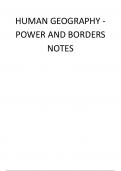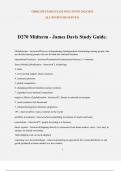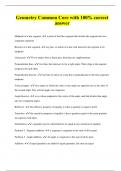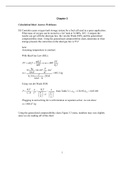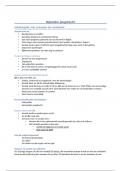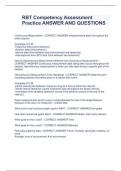HUMAN GEOGRAPHY -
POWER AND BORDERS
NOTES
, TOPIC ONE A - THE WORLD POLITICAL MAP OF SOVEREIGN NATION-STATES IS DYNAMIC
WORLD POLITICAL MAP
Shows territories of sovereign nation states. These are spatially bounded areas of land, which physically define
independent, self governing countries
- These political units are the dominant entity in the global political system and are considered to be the most
important form of spatial governance
The dynamic nature of the map is demonstrated by the formation of new countries since 1990
● Eritrea gained independence from Ethiopia in 1993 following years of armed conflict
● The area of Yugoslavia has seven countries today; the division, in 1990, was based on political, economic, and
ethnic factors. These Balkan states include Kosovo
● Namibia gained independence from South Africa in 1990 following the Namibian War of Independence
The significance of these border changes is far more than a matter of territory.
- They affect sovereignty over populations and physical resources
- They influence the economy and social geography of each area, including ethnic groups
- They influence global patterns of trade and migration (internal and international) for each country
The world political map also shows disputed international borders
Examples in South Asia include the claims of India, Pakistan, and China in the jammu and kashmir area, and the Arunachal
Pradesh border between India and China
Changes to the world political map, through processes of integration, have created politically strong and economically
important groups of countries. For example:
● Regional trading blocs such as the EU
● Global organisations such as the UN, IMF, World Bank, and WTO
● The G20 and the G7
STATE
The term state refers to the area of land, of an independent country, with well defined boundaries, within which there is a
politically organised body of people under a single government
States have the following characteristics:
● Defined territory which is internationally recognised
● Sovereignty - in which the political authority is effective and strong enough to assert itself throughout the
bounded territory
● Government recognised by other states
● Capacity to engage in formal relations with other states
● Self governing
● Permanent population which has the right to self determination
State apparatus - refers to the set of institutions and organisations through which state power is achieved
State Power
Globally there is inequality in the power and influence of states
Some have the ability to dominate and drive global systems and have significant influence of geopolitical events
Others have little influence and can only react or respond to global change
State power depends on diverse economic, social, political, and physical factors
- Ability to exploit natural resources
- Geographic location
- Demographic structure
- Industrial development
- Ability to regulate its economy
- Wealth
- International relations
, NATION
Nation refers to a large group of people with strong bond of identity that are united by shared decent, history, traditions,
culture, and language
Spatially, a nation may be confined to one country, or its people may live in an area across adjoining countries, and some
may be scattered globally in the diaspora
Many states contain several national groups
Examples
THE KURDISH NATION - Kurds are a non-Arab, Middle Eastern population inhabiting the region of Kurdistan, which includes
parts of Turkey, Iraq, Iran, Armenia, and Syria
MAORI - indigenous polynesian people in New Zealand
When a nation has an independent state of its own it is referred to as a nation-state. This is a state that has sovereignty
over a single nation
Example are Japan and France
In modern global politics nearly all states refer to themselves as nation-states, even though many contain citizens of more
than one nationality
This is partly because every government attempts to build a sense of national identity among its citizens
In many nation-states the government actively promotes nationality, often through its education system and media, in a
process of nation building
NATIONALISM
Aim of movement is often gaining and maintaining the nation’s sovereignty over its homeland to create a nation state
Identification with one’s own nation and support for its interests, especially to the exclusion or detriment of the interests of
other nations
Is often seen in a negative light as an idea that can be hateful or harmful. However, it can be something positive when in
the form of celebrating one’s nation and national identity
SOVEREIGNTY
The absolute authority which independent states exercise in the government of the land and people in their territories
It is the state’s entitlement to be its own country and ability to govern its people
Sovereignty is sustained by two political processes
● Internal sovereignty
- A state has exclusive authority within its bounded territory and no other state can intervene in its
domestic politics
● External sovereignty
- A state cannot simply proclaim sovereignty, there has to be a mutual recognition among other
sovereign states
- This ensures its territorial integrity and enables it to enter into international relations with other states
If a state’s territory (borders) are threatened or damaged, its sovereignty has been eroded and perhaps taken away
If a sovereign state is not recognised by other states, it will often find it difficult to exercise full treaty making powers or
engage in diplomatic relations with other sovereign states
TERRITORIAL INTEGRITY
Territorial integrity and sovereignty are interrelated
Territorial integrity is the principle under international law that gives the right to sovereign states to defend their borders
and the territory within them
It is enshrined in article 2(4) of the UN charter and has been recognised as customary international law
- The preservation of territorial integrity and sovereignty is therefore important in achieving and maintaining
international security and stability in the world
Under international law nation states should respect territorial integrity and should not promote border changes in other
nation states nor impose a border change through the use of force
Russia’s illegal occupation of Crimea, initiated in 2014, and its all out invasion of Ukraine in February 2022 provide example
of where the principle of territorial integrity is under attack
POWER AND BORDERS
NOTES
, TOPIC ONE A - THE WORLD POLITICAL MAP OF SOVEREIGN NATION-STATES IS DYNAMIC
WORLD POLITICAL MAP
Shows territories of sovereign nation states. These are spatially bounded areas of land, which physically define
independent, self governing countries
- These political units are the dominant entity in the global political system and are considered to be the most
important form of spatial governance
The dynamic nature of the map is demonstrated by the formation of new countries since 1990
● Eritrea gained independence from Ethiopia in 1993 following years of armed conflict
● The area of Yugoslavia has seven countries today; the division, in 1990, was based on political, economic, and
ethnic factors. These Balkan states include Kosovo
● Namibia gained independence from South Africa in 1990 following the Namibian War of Independence
The significance of these border changes is far more than a matter of territory.
- They affect sovereignty over populations and physical resources
- They influence the economy and social geography of each area, including ethnic groups
- They influence global patterns of trade and migration (internal and international) for each country
The world political map also shows disputed international borders
Examples in South Asia include the claims of India, Pakistan, and China in the jammu and kashmir area, and the Arunachal
Pradesh border between India and China
Changes to the world political map, through processes of integration, have created politically strong and economically
important groups of countries. For example:
● Regional trading blocs such as the EU
● Global organisations such as the UN, IMF, World Bank, and WTO
● The G20 and the G7
STATE
The term state refers to the area of land, of an independent country, with well defined boundaries, within which there is a
politically organised body of people under a single government
States have the following characteristics:
● Defined territory which is internationally recognised
● Sovereignty - in which the political authority is effective and strong enough to assert itself throughout the
bounded territory
● Government recognised by other states
● Capacity to engage in formal relations with other states
● Self governing
● Permanent population which has the right to self determination
State apparatus - refers to the set of institutions and organisations through which state power is achieved
State Power
Globally there is inequality in the power and influence of states
Some have the ability to dominate and drive global systems and have significant influence of geopolitical events
Others have little influence and can only react or respond to global change
State power depends on diverse economic, social, political, and physical factors
- Ability to exploit natural resources
- Geographic location
- Demographic structure
- Industrial development
- Ability to regulate its economy
- Wealth
- International relations
, NATION
Nation refers to a large group of people with strong bond of identity that are united by shared decent, history, traditions,
culture, and language
Spatially, a nation may be confined to one country, or its people may live in an area across adjoining countries, and some
may be scattered globally in the diaspora
Many states contain several national groups
Examples
THE KURDISH NATION - Kurds are a non-Arab, Middle Eastern population inhabiting the region of Kurdistan, which includes
parts of Turkey, Iraq, Iran, Armenia, and Syria
MAORI - indigenous polynesian people in New Zealand
When a nation has an independent state of its own it is referred to as a nation-state. This is a state that has sovereignty
over a single nation
Example are Japan and France
In modern global politics nearly all states refer to themselves as nation-states, even though many contain citizens of more
than one nationality
This is partly because every government attempts to build a sense of national identity among its citizens
In many nation-states the government actively promotes nationality, often through its education system and media, in a
process of nation building
NATIONALISM
Aim of movement is often gaining and maintaining the nation’s sovereignty over its homeland to create a nation state
Identification with one’s own nation and support for its interests, especially to the exclusion or detriment of the interests of
other nations
Is often seen in a negative light as an idea that can be hateful or harmful. However, it can be something positive when in
the form of celebrating one’s nation and national identity
SOVEREIGNTY
The absolute authority which independent states exercise in the government of the land and people in their territories
It is the state’s entitlement to be its own country and ability to govern its people
Sovereignty is sustained by two political processes
● Internal sovereignty
- A state has exclusive authority within its bounded territory and no other state can intervene in its
domestic politics
● External sovereignty
- A state cannot simply proclaim sovereignty, there has to be a mutual recognition among other
sovereign states
- This ensures its territorial integrity and enables it to enter into international relations with other states
If a state’s territory (borders) are threatened or damaged, its sovereignty has been eroded and perhaps taken away
If a sovereign state is not recognised by other states, it will often find it difficult to exercise full treaty making powers or
engage in diplomatic relations with other sovereign states
TERRITORIAL INTEGRITY
Territorial integrity and sovereignty are interrelated
Territorial integrity is the principle under international law that gives the right to sovereign states to defend their borders
and the territory within them
It is enshrined in article 2(4) of the UN charter and has been recognised as customary international law
- The preservation of territorial integrity and sovereignty is therefore important in achieving and maintaining
international security and stability in the world
Under international law nation states should respect territorial integrity and should not promote border changes in other
nation states nor impose a border change through the use of force
Russia’s illegal occupation of Crimea, initiated in 2014, and its all out invasion of Ukraine in February 2022 provide example
of where the principle of territorial integrity is under attack

